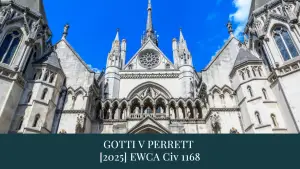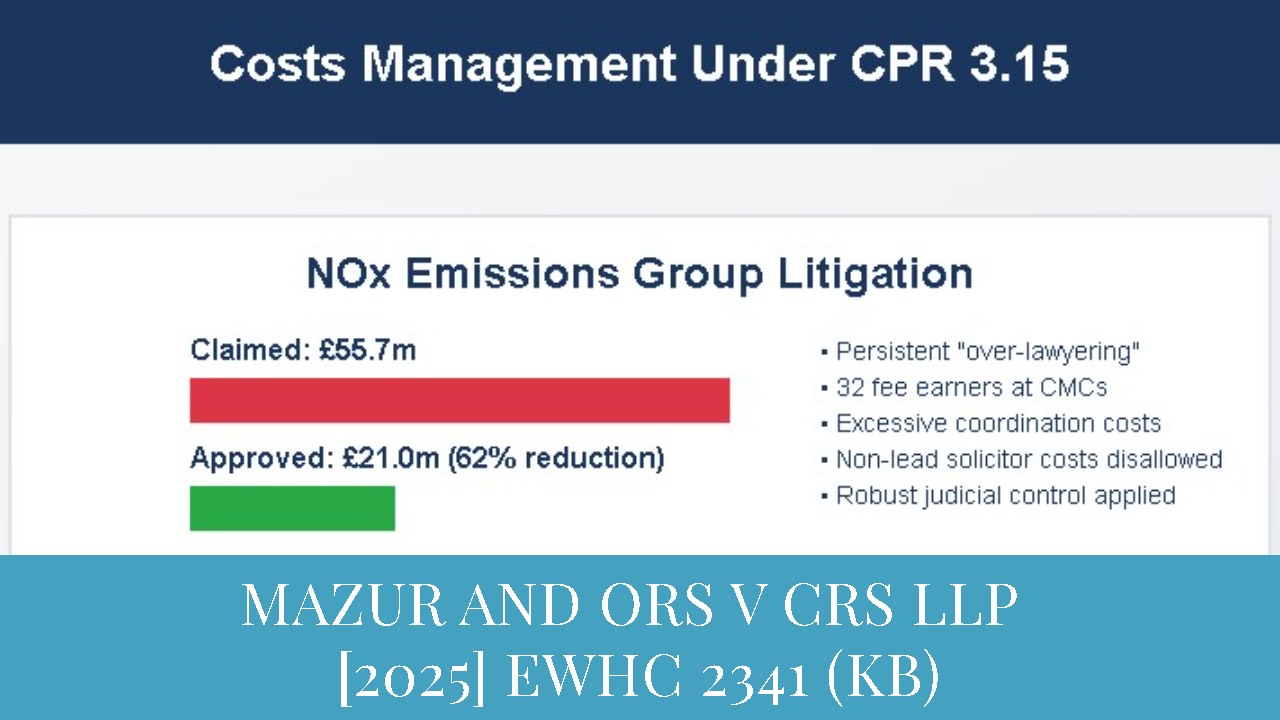The High Court’s decision in Fernandez v Fernandez [2025] EWHC 2373 (Ch) demonstrates that executors who persist in defending removal applications after their position becomes untenable risk both personal costs liability and loss of their estate indemnity.
Background
The proceedings concerned the estates of Jean Fernandez, who died on 29 March 2010, and Alexander Fernandez, who died on 14 October 2013. The appellant, Julian Fernandez, was the executor of both wills, which were discovered after initial grants of administration had been made. The first and second respondents, Leessa and Graeme (Nick) Fernandez, had obtained letters of administration for Jean’s estate in 2013, believing she had died intestate. Julian subsequently found wills for both parents dated 1 October 1996, appointing him as executor. He obtained a grant of probate for Alexander’s estate in January 2016 and for Jean’s estate in November 2019, after the validity of her will was confirmed following a trial of a preliminary issue in July 2019.
On 10 July 2018, Julian issued a claim seeking revocation of the letters of administration granted to Leessa and Nick and a grant of probate to himself. Leessa and Nick defended the claim only by putting Julian to proof of the will’s validity and brought a counterclaim seeking Julian’s removal as executor of both estates and as trustee of a discretionary trust settled by the parents in 2008. The counterclaim alleged various instances of misconduct, including mismanagement of estate assets, conflicts of interest, and a breakdown in relations between Julian and the other beneficiaries.
The procedural history was protracted. In September 2019, District Judge Watson ordered Leessa and Nick to pay Julian’s costs of the preliminary issue concerning the validity of Jean’s will, with detailed assessment, and gave directions for a four-day trial of the counterclaim. However, the parties subsequently sought and obtained multiple stays to negotiate a settlement, including an unsuccessful mediation in January 2022. In June 2023, HHJ Paul Matthews refused a further stay, directing that the litigation must proceed. Fresh directions were given by District Judge Taylor in November 2023, leading towards a four-day trial.
On 28 March 2024, Leessa and Nick applied for summary determination of the removal application. This was heard by District Judge Wales on 16 September 2024 [§14]. On 29 October 2024 [§15], the judge handed down his substantive judgment. Following a hearing on 3 December 2024 for consequential matters, the judge made an order removing Julian as executor and trustee and appointing an independent professional trustee. At the hearing on 3 December 2024, the judge also dealt with consequential matters, including costs. He delivered a series of extempore judgments on costs, resulting in an order that Julian pay the respondents’ costs on the standard basis up to 28 March 2024 and on the indemnity basis from 28 March 2024 onwards [§26, §135], and that Julian be deprived of his right to indemnity from the estates and trust for his litigation costs (but not his administration costs) [§24, §127-128]. Julian appealed against this order, with permission granted by Michael Green J on 3 March 2025. The appeal was heard on 8 July 2025 before HHJ Paul Matthews sitting as a Judge of the High Court [§1].
Costs Issues Before the Court
The appeal required the court to review the costs orders made by District Judge Wales on 3 December 2024. The specific costs issues for determination were:
- Whether the judge erred in ordering Julian to pay the respondents’ costs of the counterclaim and the application.
- Whether the judge erred in awarding costs on the indemnity basis for the period following the application dated 28 March 2024.
- Whether the judge erred in depriving Julian of his right to indemnity from the assets of the estates and trust in respect of his own litigation costs and the costs liability imposed by the order.
- Whether the judge erred in setting the payment on account of costs at £55,000.
These issues arose in the context of hostile litigation between an executor/trustee and beneficiaries, engaging special principles under the Civil Procedure Rules and trust law.
The Parties’ Positions
The Appellant’s Position Julian argued that the costs orders were erroneous. He submitted that there was no sufficient evidence of misconduct to justify ordering him personally to pay costs or depriving him of his indemnity from the estates. He contended that the litigation was necessary for the proper administration of the estates and that he had acted properly throughout. Regarding indemnity costs, he argued that such an award required a finding of exceptional conduct, such as bad faith or gross negligence, which was not present. He also criticised the judge for failing to consider the respondents’ own litigation conduct and for not providing adequate reasons for the costs orders.
The Respondents’ Position The respondents supported the costs orders. They argued that the litigation was hostile and that Julian had acted in his own interests rather than for the benefit of the estates. They submitted that Julian’s continued resistance to removal after the application of 28 March 2024 was unreasonable, justifying indemnity costs for that period. They contended that Julian should not be entitled to an indemnity for litigation costs because he had acted for a benefit other than that of the estates, citing his conflicts of interest and the adversarial nature of the proceedings. They also argued that the payment on account was appropriately calculated. They faced a “formidable obstacle” in challenging the costs consequences [§17], citing Webb v Liverpool Women’s NHS Foundation Trust [2016] EWCA Civ 365.
The Court’s Decision
The appeal was dismissed, and the costs orders of District Judge Wales were upheld. The court analysed each costs issue as follows.
Order for Costs Against the Executor
The court held that the judge was entitled to order Julian to pay the respondents’ costs. The general rule under CPR rule 44.2(2) is that the unsuccessful party pays the costs, and the respondents were the successful parties on the counterclaim and application. The judge correctly characterised the litigation as hostile, meaning the usual inter partes principles applied, rather than treating it as trust litigation where costs might be paid from the estate. The court referred to the principle that a trustee or executor is not automatically entitled to an indemnity for costs incurred in hostile litigation, especially where they have acted for their own benefit. The judge’s decision that Julian had acted in substance for a benefit other than that of the estate was an evaluative judgment open to him on the evidence, particularly given the conflicts of interest and the breakdown in relations.
Indemnity Basis Costs
The court upheld the award of costs on the indemnity basis for the period following the application of 28 March 2024. The judge had applied the correct test, namely whether the case was taken “out of the norm” by the paying party’s conduct. The judge found that Julian should have realised his position was untenable after that date, given the clear conflicts of interest and the hostility between the parties. His continued resistance was conduct outside the ordinary and reasonable conduct of proceedings. The court cited Excelsior Commercial & Industrial Holdings Ltd v Salisbury Hammer Aspden & Johnson [2002] EWCA Civ 879 and Three Rivers District Council v Bank of England [2006] EWHC 816 (Comm) but emphasised that the test is not limited to specific examples like fraud; any conduct making the case exceptional can justify indemnity costs. The judge’s decision was not plainly wrong and fell within his discretion.
Deprivation of Indemnity from Estate/Trust
The court affirmed the order depriving Julian of his right to indemnify himself from the estates and trust for litigation costs [§127]. Under section 31(1) of the Trustee Act 2000 and CPR rule 46.3, a trustee or executor is entitled to an indemnity only for expenses “properly incurred”. CPR Practice Direction 46 paragraph 1 provides that costs are not properly incurred if the trustee acted for a benefit other than that of the estate. The judge found that Julian had acted in his own interest in the hostile litigation, which was a sufficient basis to deny the indemnity. The court noted that this was consistent with the obiter comments in Armitage v Nurse [1998] Ch 241, where a trustee who successfully defends a claim is entitled to an indemnity, but one who unsuccessfully defends may not be. Importantly, the judge’s distinction between administration costs (where indemnity was preserved) and litigation costs (where it was denied) was justified [§24, §128].
Payment on Account
The court found no error in the payment on account of costs set at £55,000. The judge had considered the estimated costs and exercised his discretion appropriately under CPR rule 44.2(8). No specific challenge to the amount was raised in the appeal, and the court saw no basis to interfere.
Adequacy of Reasons
The court rejected the argument that the judge failed to provide adequate reasons for the costs orders. The extempore judgments on costs spanned several pages and addressed the key issues, including the basis for awarding costs, the decision on indemnity costs, and the deprivation of indemnity. The court cited English v Emery Reimbold & Strick Ltd [2002] 1 WLR 2409, noting that reasons need not be exhaustive but must show the basis of the decision. The judge’s reasons met this standard.
In conclusion, the appeal court found that the judge below had correctly applied the legal principles and that his costs orders were within the generous ambit of his discretion. All grounds of appeal failed, and the appeal was dismissed.

A short judgment looking at trust and estate costs principles
Executors’ entitlement to indemnity from estates under Trustee Act 2000 s31 and CPR PD 46, distinguishing hostile litigation from proper administration.
Indemnity Basis Costs Following Discontinuance
When litigation conduct is sufficiently “out of the norm” to justify indemnity costs following discontinuance.
Claimant’s Costs Reduced By 40% Due To Chaotic Litigation Conduct
High Court reduces litigant in person’s costs by 40% for chaotic conduct whilst refusing indemnity costs despite fraud findings.
High threshold required for indemnity costs – difficult behaviour alone insufficient without exceptional circumstances.
Trust and fund costs principles under CPR 46 including when costs must benefit the fund to qualify for indemnity.


![FERNANDEZ V FERNANDEZ [2025] EWHC 2373 (Ch)](https://tmclegal.co.uk/wp-content/uploads/2025/09/Willis-Title-copy-copy-copy-copy-6.jpg)


![STOCKLER AND ANOTHER V THE CORPORATION OF THE HALL OF ARTS AND SCIENCES [2025] EWHC 2262 (SCCO)](https://tmclegal.co.uk/wp-content/uploads/2025/09/YT-Thumb-300x169.webp)











